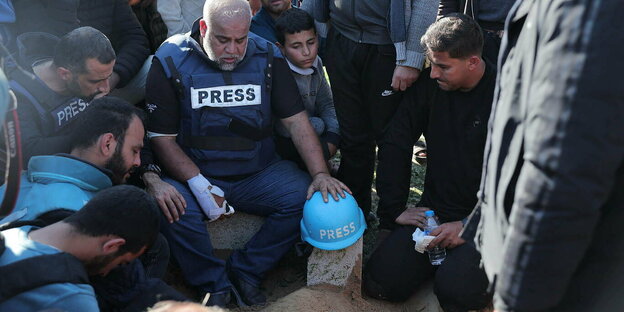Gaza has become the deadliest war zone for journalists. Reporters Without Borders wants every death to be carefully investigated.

Palestinians attend the funeral of Al Jazeera journalist Hamza Wael Dahdouh Photo: imago/ap
taz: Mr. Resch, in early January Al-Jazeera journalist Hamza Dahdouh and one of his colleagues were killed in a rocket attack by the Israeli army. The British guardian He claimed the attack was targeted. How do you evaluate the case?
Christopher Resch: The case is particularly tragic. Hamza al-Dahdouh is the son of well-known journalist Wael Dahdouh, Al Jazeera's Gaza bureau chief. He has already lost several close family members to Israeli airstrikes, his wife, a grandson and now his third child, Hamza. But the case also shows the battle over narratives that accompanies this war.
He is press officer for Reporters Without Borders. He studied journalism and Arabic studies in Leipzig and Istanbul.
Israeli forces fired two rockets at the car in which Dahdouh and his colleague Mustafa Thuraya were sitting. Military spokesmen later claimed that a Hamas terrorist was also in the car, but they had to retract this claim. We urgently call for an independent investigation into this and other cases.
Are there any cases where it is clearly proven that the Israeli army deliberately killed journalists?
There is evidence of this, but it usually cannot be clearly demonstrated. An exception is the case of Reuters journalist Issam Abdallah on October 13, almost a week after the start of the war.
Abdallah was in southern Lebanon, on the border with Israel, and reported on fighting between Hezbollah militia and Israeli forces. They killed him with a grenade.
There is overwhelming evidence that the Israel Defense Forces must have known that he and six other colleagues were working there. We also investigated this. Talk of selective murders of journalists are harsh accusations that should not be taken lightly. But we investigate all cases, and at least in this one it seems that way.
Other attacks may not have targeted journalists, but can their legitimacy still be questioned?
Yes, we criticize them with reference to international criminal law: in our opinion, these are disproportionate and indiscriminate attacks that simply do not sufficiently take into account the fact that journalists are attacked as a group of the civilian population.
In Germany, the deaths of numerous journalists did not cause great indignation.
It is already being discussed, I myself have given many interviews in the last three months, but a really big debate is not gaining momentum. At Reporters Without Borders we have filed two criminal complaints with the International Criminal Court with which we want to guarantee that possible war crimes committed by Israel and Hamas against journalists are investigated. But our press releases were hardly echoed in the German media.
According to the Committee to Protect Journalists (CPJ), at least 79 journalists have been murdered so far. Reporters Without Borders currently speaks of 22. Where does this difference come from?
In reality there is no difference, CPJ currently counts 79 journalists murdered and we count 80. However, we really try to prove beyond a doubt that the journalist was beaten during or because of his work. This is an obligation under our mandate and this verification sometimes just takes a while.
I can understand criticism of the approach, but our position is that no one benefits if we jump to conclusions. But we communicate both figures, the verified figure and the total figure, because, personal tragedy aside, each individual case naturally has an impact on journalism as a whole and on the information we get from Gaza.
Are a relatively large number of journalists dying in the war between Israel and Gaza?
Yes, for example, CPJ says it is the world's deadliest war for journalists ever recorded. We can agree with that. It must be clear that the fact that so many journalists have been killed is due to the way Israel wages war. Widespread bombing does not protect the civilian population and we believe that the Israeli army must do much more in this regard.
What about the independence of reporting from the war zone in this situation?
Since October 7, journalists can only enter Gaza if they travel with the Israeli army. They then have to present their material to the army, which is not unusual in this type of reporting. We demand that more international media be allowed into the country through the Israeli and Egyptian border crossings.
And how do the Palestinian media report?
I have the greatest respect for the courage and work of Palestinian journalists; They are currently the window through which the world can look at Gaza. But, of course, there are difficulties, the local population lives in the middle of the war, they themselves are afraid, there may be wounded and dead in the immediate vicinity, there is a lack of electricity and fuel. And of course, Hamas also suppresses critical information, although there has always been a vibrant civilian population in Gaza that makes critical journalism possible.
Al-Jazeera in particular has an enormous influence on information.
Al-Jazeera was and has never been a truly independent broadcaster. People have always followed to some extent what the ruling family of Qatar dictated. Al-Jazeera's international programming tends to be a bit more freewheeling and serious, but should still be viewed with caution. The main international news agencies, such as Reuters and AFP, are also present in Gaza and try to report in detail. If you look at everything together, a general picture emerges.
However, there is also a suspicion that Palestinian journalists knew about the October 7 terrorist attack and were therefore present at the events from the beginning. How do you assess the accusation?
At this point, this is still a suspicious report, but it has had very real consequences: there were several high-ranking Israeli politicians who called for these people to be killed. But journalists are not easy prey.